 |
|
|
Third Part of the United Nations Conference for the Negotiation of a Successor Agreement to the International Tropical Timber Agreement, 1994
|
|||||
| 27 June – 1 July 2005 | Geneva, Switzerland | |||||


| Joint Working Group | ||
 |
|||
|
Panel from the Joint Working Group. From left to right: WGI Chair, Alhassan Attah, Ghana, WGII Chair Jürgen Blaser, Switzerland, and Lisanne Losier, UNCTAD
|
|||
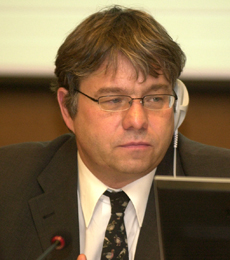 |
 |
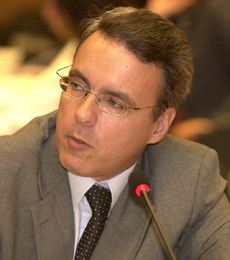 |
|||||
| WGII Chair Jürgen Blaser, Switzerland, opened the joint working group session, saying delegates should focus first on the issue of the special vote, and second on Chapter VI (Finance) | On the special vote, WGI Chair Alhassan Attah, Ghana, invited delegates to discuss whether such a vote is needed and, if so, determine the threshold that would trigger a special vote in each group | Luiz Cesar Gasser, Ministry of Foreign Affairs of Brazil, urged for agreement on the need to ensure the funding of key policy activities | |||||
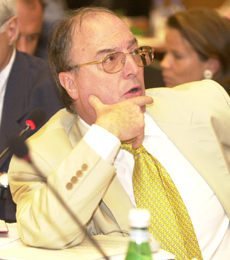 |
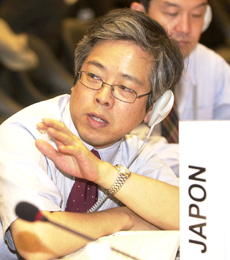 |
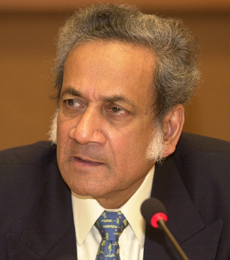 |
|||||
| Enzo Barattini, European Commission, said special votes should be used but first delegates should decide on its principles, and then assess all the articles under the Agreement that refers to special votes | Koichi Ito, Ministry of Foreign Affairs of Japan, noted if consensus is not reached, there could be two alternatives, namely simple distributed majority vote and special vote | B. Che Yeom Freezailah, Malaysian Timber Certification Council, preferred the current three-tiered system of voting | |||||
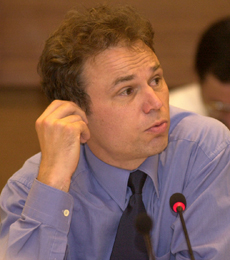 |
 |
 |
||||
| On Chair Blaser’s proposal to replace the original article on the Special Account, Daniel Birchmeier, Switzerland, insisted that the new proposal must make reference to both policy work and project activities of the Organization | Don Wijewardana (left), New Zealand and Stephanie Caswell, US, expressed concern about having differentiated criteria for special vote regarding producer and consumer members | |||||
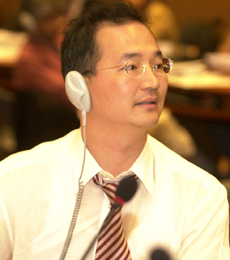 |
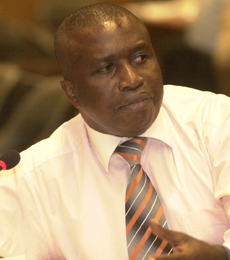 |
 |
|||||
| Junho Ko, Korea Forest Service, Republic of Korea, asked for clarification on the US proposal | Fredua Agyeman, Ministry of Lands and Forestry, Ghana, stressed the need to identify the articles under the agreement that will require special votes | Anthoyn Jarbo Taplah, Liberia, questioned why a special vote is needed if decisions have always been taken by consensus | |||||
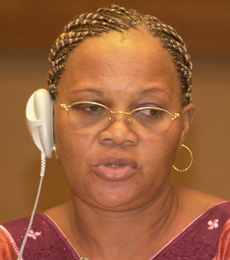 |
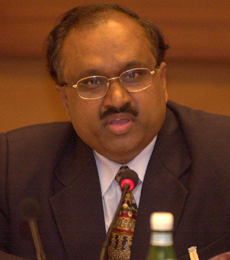 |
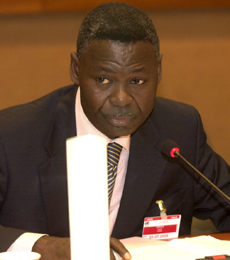 |
|||
|
Célestine Ntsame-Okwo, Congo (right), Bipin Behari (center), Ministry of Enviornment and Forests of India, and Gregoire Nkeoua (right), Congo, underscored the need to structure the discussion on special votes, by: defining its concept; deciding on the terms of thresholds; and deciding which articles should use special vote system
|
|||||
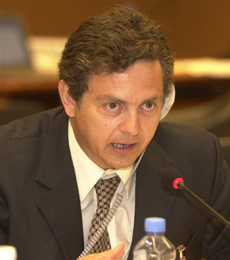 |
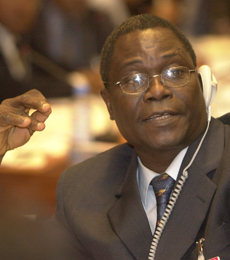 |
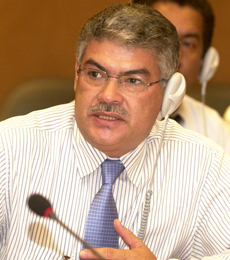 |
|||||
| Alejandro Romero Hernández, Mexico, argued that for simple decisions a simple vote will do | Afolabi Oyebo Macarthy, Nigeria, urged delegates to follow the golden rule meticulously in order to obtain desired movement forward | Luis Eveline, Honduras, commented that technical experts in tropical timber may not be the most qualified to deal with issues of voting systems | |||||
 |
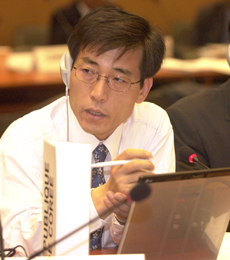 |
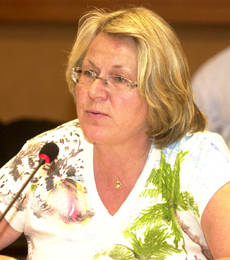 |
|||||
| Sandra Ribey, Natural Resources Canada, called for deletion of a paragraph defining "simple majority vote" | Hae-wook Cheong, Ministry of Foreign Affairs and Trade Institute of Foreign Affairs and National Security, Republic of Korea, supported a two-tiered system, with decisions taken by either consensus or "vote" | Inga Magistad, Ministry of Foreign Affairs of Norway, explained how its proposal reflects a programmatic approach to development assistance similar to that of other organizations | |||||
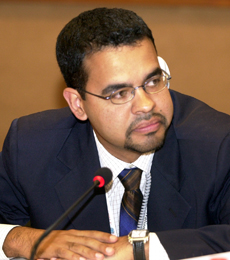 |
 |
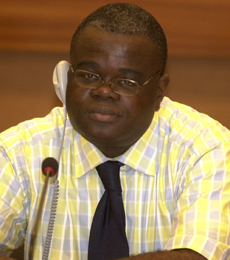 |
|||||
| Juan Carlos González Ortega, Ministry of Foreign Affairs of Venezuela, agreed to text on illegal harvesting and illegal trade in tropical timber and non-timber forest products | Li Quiang, Ministry of Commerce of China, announced that a small group had reached compromise on language defining developing country members | Alain Ngoya-Kessy, Congo asked for information on specific areas in which a contributor may delegate decisions on project funding to the Executive Director | |||||
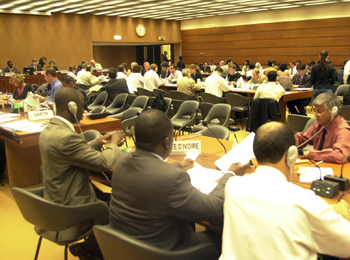 |
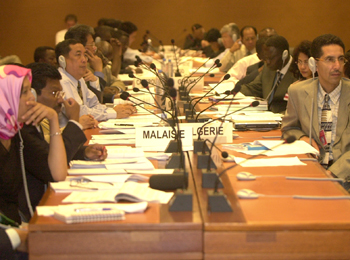 |
|||
|
Participants at the working group
|
||||
 |
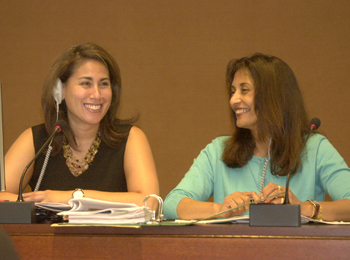 |
||||
|
EC delegation
|
ITTA-3 rapporteurs
|
||||
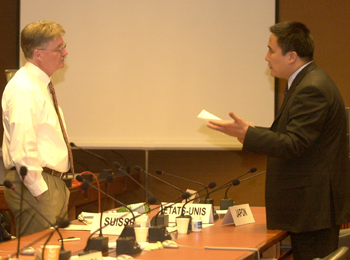 |
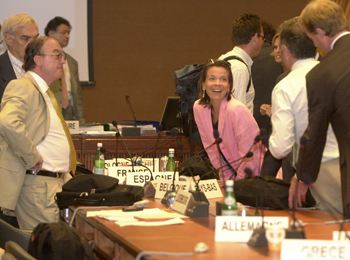 |
|||
|
David Brooks, US and Li Quiang, China
|
||||
| Working Group I | ||
 |
|||
|
Panel from the Working Group I. From left to right: WGI Vice-Chair Jan McAlpine, US, WGI Chair Alhassan Attah, Ghana, and Catherine Sibut-Pinote, UNCTAD
|
|||
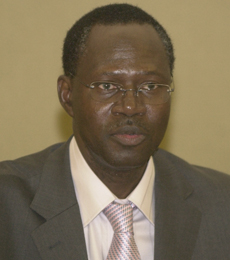 |
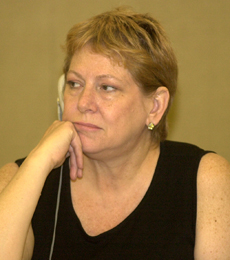 |
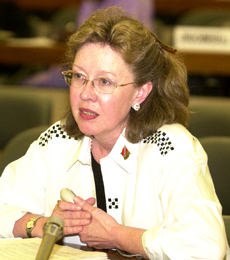 |
|||||
| WGI Chair Alhassan Attah, Ghana, continued paragraph-by-paragraph deliberations on outstanding articles regarding: special sessions of the Council, distribution of votes, admission of observers, and definitions | WG I Vice-Chair Jan McAlpine, US, urged delegates to consider the usefulness of each definitions, avoiding academic discussion on terminology | On SFM, Stephanie Caswell, US, said definitions should concentrate in crucial terms for operationalizing the Agreement, and suggested Council should decide what SFM meant | |||||
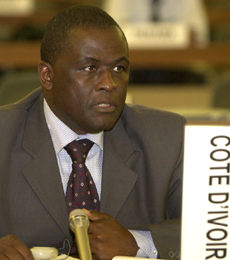 |
 |
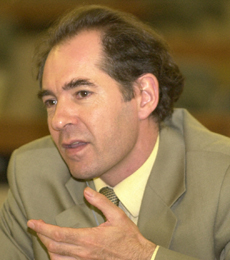 |
|||||
| On allocation of votes to African producer members, Martial Kouame ME, Côte D'Ivoire, said more consultation with the region is needed | On the votes of producer members, Rubén Darío Guerrero Useda, Colombia, favored distribution in accordance with their respective shares of total “tropical forest resources” rather than “tropical forests” | John Bazill, EC, suggested, and delegates agreed to, delete the “non-timber forest products” definition because it was redundant | |||||
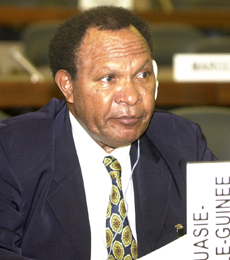 |
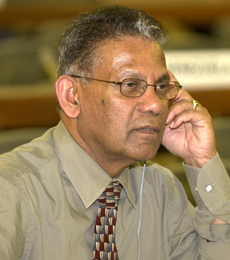 |
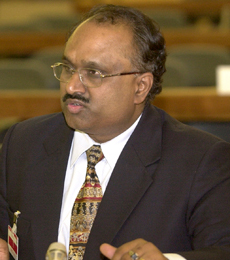 |
||||
| Dike Kari, Papua New Guinea, stressed the importance of retaining the concept of SFM in the Agreement | Don Wijewardana (left), New Zealand, and Bipin Behari (right), Ministry of Enviornment and Forests of India, said there was no need for defining “further processing,” and delegates agreed to delete it | |||||
 |
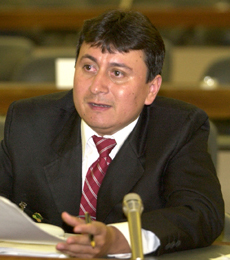 |
||||
| On the possibility of Council convening alternate sessions outside the Organization headquarters, Taira Iwasaki, Ministry of Foreign Affairs of Japan, highlighted if that happens it will be difficult for his country to financially support the meeting due to domestic issues on transparency and accountability | On “non-timber forest products,” Renzo Silva, Ministry of Environment and Natural Resources of Venezuela, underscored the importance of defining such term | ||||
| Other photos | ||
 |
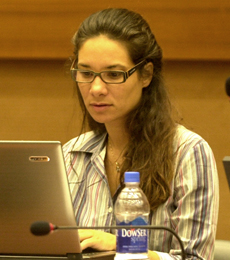 |
||||
|
Merethe Luís, Ministry of Foreign Affairs of Norway and David Brooks, US
|
Karen Alvarenga de Oliveira (Brazil), ENB writer
|
||||
 |
|||
|
Matthias Schwoerer, Germany and Franz Xaver Perrez, Swiss Agency for the Environment, Forests and Landscape
|
|||
|
Relevant Links
|
|||
|
|
|
|
|
|
|||||
|
|
|
|
